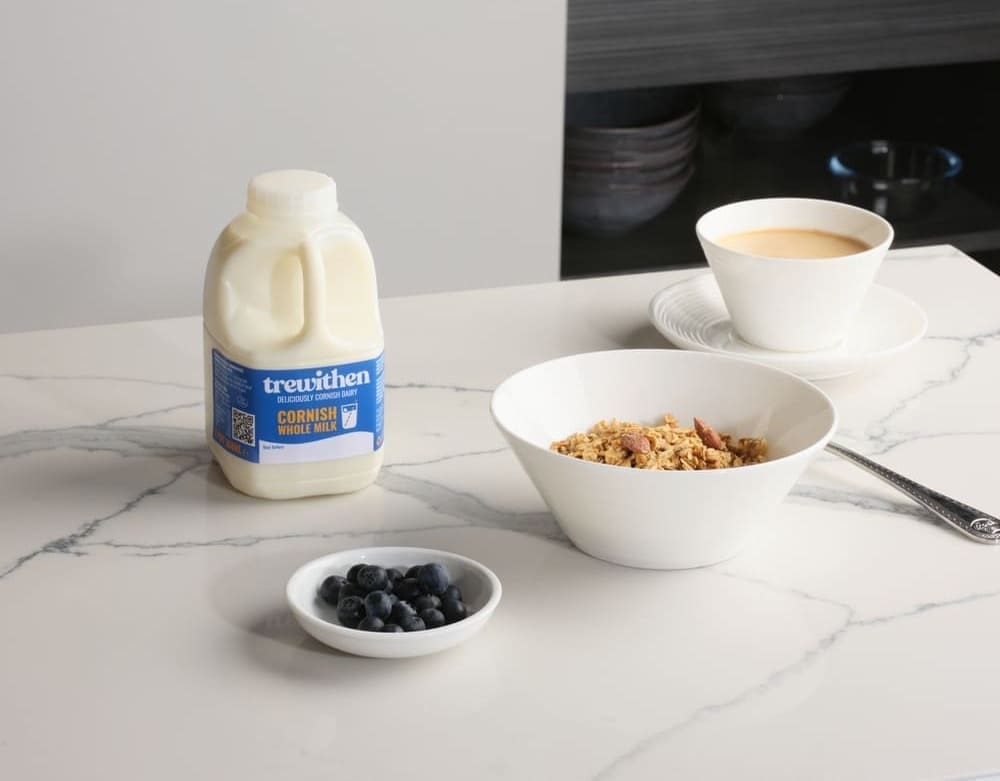“Rich in Protein”, “Source of Protein”, “High in Protein” – take a glance in the fridge or pantry and you’ll see a whole host of products putting their protein content centre stage, right on the front of their packaging. With clear benefits like helping us grow healthy bones and muscles, we’re becoming increasingly focused on ensuring our diets contain enough protein.
The market is brimming with protein products, from bars and powders to snacks and shakes. Aside from specialist products, some of our traditional staple foods, such as meat and dairy, are protein-rich too. In this post, we’ll examine if milk is high in protein content, compare it to other sources, and decide whether milk should be considered a protein powerhouse.
Table of Contents
How Much Protein Do You Need?
Before putting the spotlight on milk, let’s first look at how much protein we should be getting every day.
Daily Protein Requirements
In the UK, the Reference Nutrient Intake (RNI) of protein is 0.75 g for every kilo of body weight, or around 56 g per day for the average male and 45 g for an average female (depending on body weight).
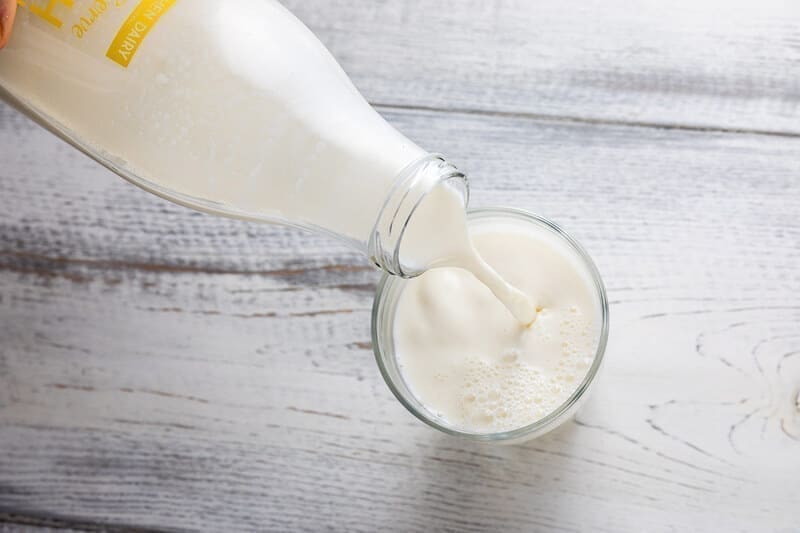
The Benefits of a Protein-Rich Diet
Protein plays an essential role in keeping our body working and growing well. It helps us build healthy bones, muscles and cells and gives us energy. Our body also uses protein in different forms to create hormones, and haemoglobin to transport oxygen and carbon dioxide from and to the lungs. Protein is made up of amino acids, some of which our bodies can produce by themselves, while others we must get through our food. It’s generally recommended that you get your protein from a variety of sources to maintain a healthy balanced diet.
Understanding Milk’s Protein Content
Is Milk a Good Source of Protein?
Milk contains 3.4-3.5 g of protein per 100 g, or around 7 g per 200 ml glass. In other words, a glass of milk contains around 12.5% of a man’s recommended daily intake of protein and 15.5% of a woman’s. Not only does milk contain a good amount of protein, it’s high-quality protein too, providing all of the essential amino acids our body needs. As well as protein, milk contains a range of vitamins and minerals that can help you maintain a healthy lifestyle, from Vitamin D and calcium to magnesium and potassium.
Protein Content in Trewithen Dairy Milk
Here at Trewithen Dairy, we transform the highest quality Cornish milk into delicious protein-rich dairy products. Per 100 ml, our Cornish Whole Milk and Cornish Semi-skimmed Milk contain 3.4 g of protein, while our Cornish Barista Milk and Cornish Skimmed Milk contain 3.5 g.
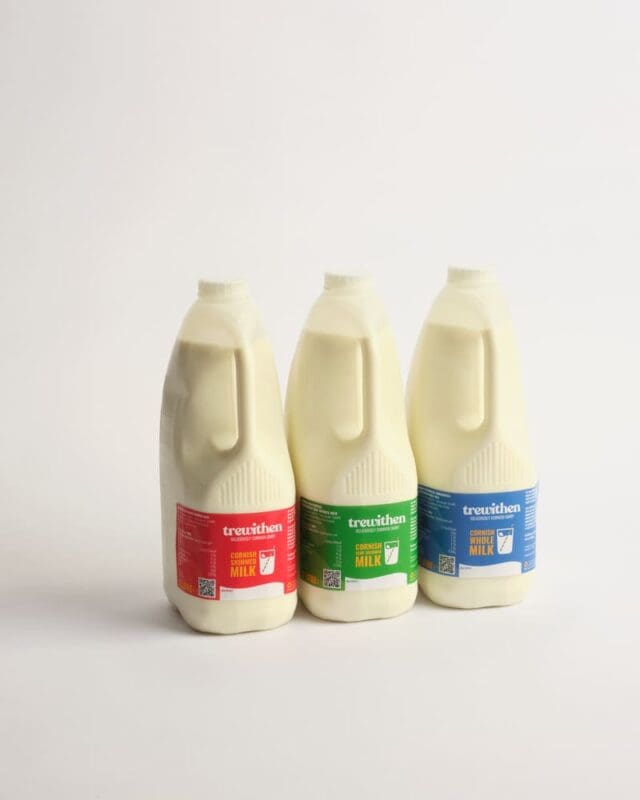
Comparing Milk to Other Protein Sources
So, now we know milk can contain as much as 15% of our recommended daily amount of protein. To decide whether this puts milk in the position of protein powerhouse, let’s see how other sources compare.
Milk vs. Plant-Based Alternatives
There are various plant-based sources of protein. Take milk alternatives for example, according to product labelling, standard soy milk can contain around 3.3 g of protein per 100 ml, although high-protein products are available. Oat milk may contain as little as 1 g, and almond milk can be less than 0.5 g of protein per 100 ml. So when it comes to milk alternatives, soy provides the most protein, although this is marginally less than regular dairy milk.
Aside from milk, you’ll also find protein in nuts and beans and more processed options like tofu. According to McCance and Widdowson’s Composition of Foods Integrated Dataset, canned chickpeas and beans like cannellini and haricot can have 7-8 g of protein per 100 g, dry roasted peanuts have 25.7 g, and steamed and fried tofu contains a whopping 23.5 g. So it’s clear these plant-based foods can provide a protein boost too.
Milk vs. Other Animal-Based Proteins
Animal-based sources of protein include meat, fish and eggs. Per 100 g, meat such as a sirloin steak boasts around 30 g, fish like fresh tuna can have as much as 32 g and humble eggs have 14.1 g. There’s no doubt, meat, fish and eggs are packed with protein.
Which has more protein, milk or egg?
As we’ve seen, per 100 g, milk typically contains 3.5 g of protein, while eggs have a chunky 14.1 g. To put that into context, a 200 ml glass of milk has roughly the same amount of protein as one medium egg. Put eggs and milk together in breakfast favourites like omelettes and scrambled eggs, and you’re onto a winning protein combination and a great way to start your day.
Which Dairy Product has the Highest Protein?
Cheese typically has the highest protein content of all dairy products, with styles such as Emmental and cheddar containing 30.2 g and 25.4 g per 100 g respectively. Cheese can be high in saturated fat though. The Association of UK Dieticians recommends a portion size of just 30 g, so one portion of cheddar would have around 7.6 g of protein, similar to a glass of milk. Yoghurts are also good sources of protein, with Greek style typically containing the most.
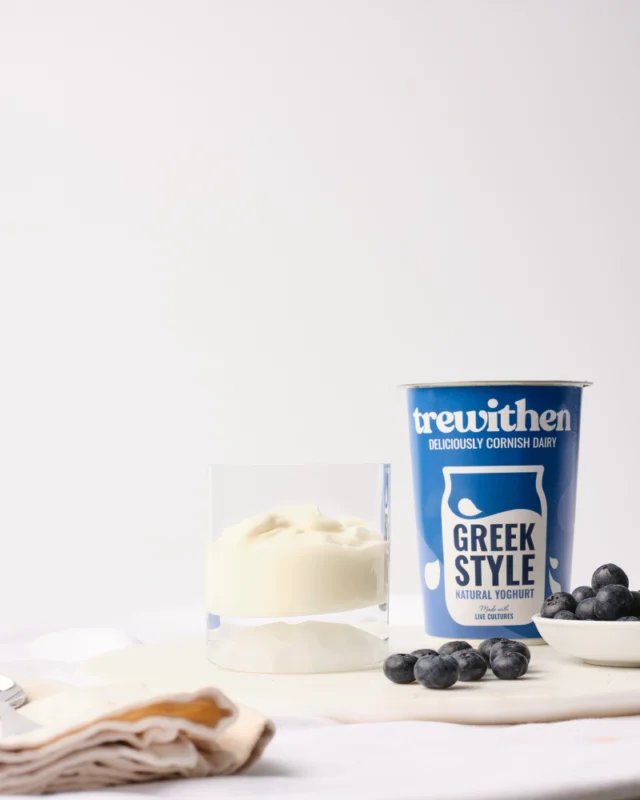
Maximising Protein Intake with Trewithen Dairy Products
Here at Trewithen Dairy, we’ve been crafting delicious dairy products from local Cornish milk for 20 years. Our fresh Cornish Milk comes from a blend of Brown Swiss, Friesian, Holsteins and Jersey herds, raised locally in Cornwall’s lush coastal climate. With as much as 7 g in every glass, our milk is not only delicious, it’s a good source of protein too. It’s available in whole, semi-skimmed, skimmed and even speciality barista, the perfect companion for your next cuppa.
We also craft irresistible yoghurts from our milk that pack a protein punch. You’ll find 5.1 g of protein per 100 g in our Greek Style Natural Yoghurt and Peaches and Cream Yoghurt, while our Strawberries and Cream variety has 4.4 g.
Creative Ways to Boost Your Protein Intake with Our Recipes
At Trewithen Dairy, we understand it’s important to get your daily protein intake from a variety of sources as part of a balanced diet – which is a great excuse to get creative with your food! We’ve put together some mouthwatering recipes that take our protein-rich dairy products to the next level. Try the Turkish Eggs Breakfast Hash for a protein double-whammy of eggs and Greek yoghurt. Or for a hearty dinner, give Stargazy Pie a go. It’s got eggs, mackerel and whole milk for a trio of protein. There’s also a cheeky dollop of clotted cream for extra deliciousness!
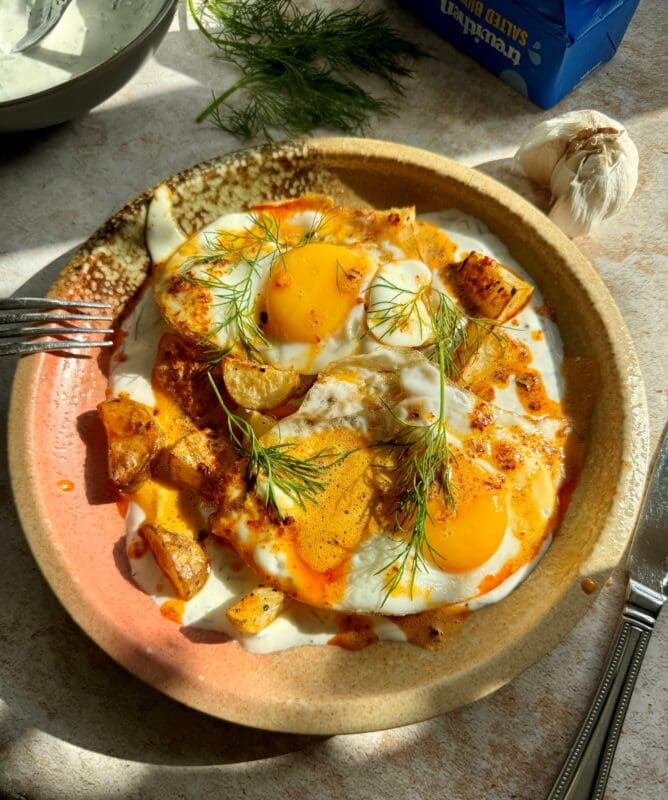
Conclusion: Milk as a Valuable Protein Source
So, can we say milk is a protein powerhouse? We’ve seen that milk is a good source of protein and contains the essential amino acids our body needs. It also has lots of other nutrients that help us lead a healthy lifestyle. Products made from milk such as yoghurt can provide even more of your daily protein. We’ve also highlighted that milk is a versatile ingredient that pairs perfectly with other protein-rich foods to create delicious dishes that can make getting your protein intake as easy as pie (literally!). To that effect, as part of a balanced diet, it’s fair to say that milk is a valuable source of protein.
Key Takeaways
Fresh milk and yoghurts from Trewithen Dairy can be great sources of protein.
- Our body needs protein to grow healthy bones, muscles and cells.
- It’s recommended that we get 0.75 g of protein per kilo of body weight.
- A glass of milk can contain 12 – 15% of your recommended daily intake of protein (depending on body weight).
